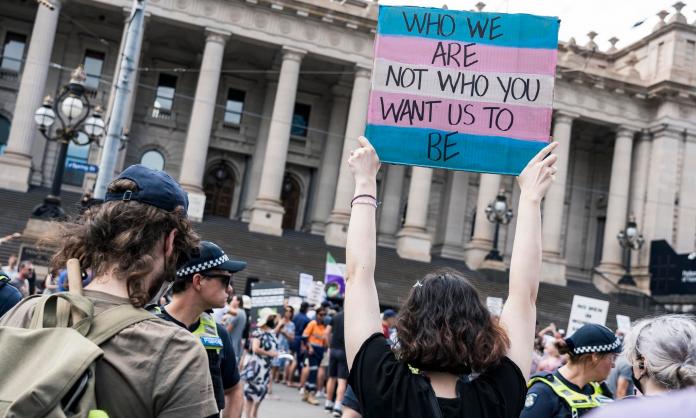UK transphobe Kellie-Jay Keen—aka Posie Parker—was sent packing from Australia and New Zealand last month after her events were dogged, and outnumbered, by protesters.
While her tour was pitched as a series of “women’s rights” gatherings, her events are virulently transphobic, and have in the past featured right-wing speakers and attendees from groups such as the Proud Boys and the fascist British National Party.
Keen has built her brand by appearing on far-right talk shows and podcasts, and working alongside some of the most sexist anti-abortion political pressure groups. Her events bring together Christian conservatives, fascist groups and transphobic feminists.
Fortunately, a successful campaign of protests organised by the National Union of Students LGBTI Department and LGBTI and socialist activists around the country stymied her agenda in Australia.
After Keen’s tour was outnumbered by protesters in Sydney, Brisbane, Adelaide and Perth, a group of twenty neo-Nazis attended Keen’s Melbourne event near the Victorian Parliament.
In their own words, they aimed to “act as a vanguard for a protest against the constant paedophilic agenda being forced upon our children and our people”, and declared: “the only solution to this sickness is White Revolution!” The Nazis marched around the edge of Keen’s rally performing the Hitler salute.
The fallout was substantial. The presence of Victorian Liberal MP Moira Deeming at the event sent the Liberals into a spin. Leader John Pesutto attempted to expel her from the party room, citing not only her decision to stay after the neo-Nazis arrived, but her presence at the transphobic event itself. The right wing of the party managed to defeat the expulsion attempt, but Deeming was still suspended for nine months.
The rally pulled at internal tensions in the party—between the socially reactionary freaks who now make up a large part of the membership, and the moderates who want the party to focus on supporting businesses rather than fighting the culture wars.
The ramifications have not been limited to the Liberal Party.
As recently as the start of this year, there were indications that the Labor state government still intended to pursue its religious discrimination bill, which would entrench the right of employers to discriminate against transgender workers. The future of this bill now seems uncertain.
A fortnight after Keen’s event, Victorian Trades Hall backed a big demonstration for Trans Day of Visibility. This was perhaps the largest ever demonstration for trans rights in Australia, with 5,000 joining the Melbourne rally to oppose the far right and declare their support for trans people.
Initially, a request for union backing for the rally against Keen was firmly rejected. After the success of the protest, the widespread anger at the presence of the far right, and the increased spotlight on Keen, the unions changed their tune and backed a fantastic mass demonstration. Thousands of people who were not at the first demonstration were moved by it to act.
The results for the anti-trans movement were dismal. Keen’s tour went from being described by the press as a “women’s rights event”, to a “controversial women’s rights event”, to, finally, and correctly, a far-right event. Her subsequent appearances in Hobart and Canberra were met with larger protests, and culminated in her being driven out of Auckland by a crowd of thousands.
Any plausible deniability regarding the link between anti-trans activism and right-wing politics was shattered. It’s clear that anti-trans activists, even those who are feminists, are engaged in a campaign against oppressed people and are organising in connection with the right.
Importantly, the protests were a galvanising experience for participants. Hundreds of mostly young LGBTI people stood together against the right-wing transphobes and ruined Keen’s tour.
All these outcomes show the importance of the left continuing to organise protests against the right’s anti-trans bigotry.
Other strategies were floated—such as teaming up with more conservative forces to try to get Keen’s visa cancelled, organising something non-confrontational and disconnected from Keen’s tour elsewhere, and trying to appeal to some of the bigots not to be bigoted. None would have led to the success achieved by the campaign of protests.
Rowdy protests around the country, especially in Melbourne, have put paid to Keen’s pretences of being some concerned women’s rights activist, sent the Liberals into a spin, involved many people in protest action, and drawn broader forces into mobilising in defence of trans rights.
We know that the far right is using transphobia to build its ranks. Often, the lead anti-trans activists couch their project in faux concern for women, gays and lesbians. The events of the last few weeks have shown up that lie, with society’s most virulent sexists backing Keen's tour, and our own domestic anti-trans campaigner Mark Latham spewing homophobic bile on twitter.
The biggest transphobes are also the biggest haters of women and gay people. Campaigning that takes up transphobia as a feature of contemporary far-right politics, and which links trans oppression with women’s and gay oppression, is effective. The foundation for campaigns such as the one against Keen's tour is the socialist left, and building this left will be essential in the fight against the right.








